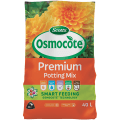Growing your own delicious, healthy fruits and vegetables starts from the ground up. Improve the quality of your soil and you‘ll be rewarded with tasty produce and a plentiful harvest.
Healthy soil is rich in organic materials which encourage beneficial microbes to your veggie patch. These help to make the soil crumbly and active.
Healthy soil has:
- Plenty of available nutrients
- Crumbly loam texture
- Good drainage - medium to high porosity
- Good aeration - plenty of available oxygen
How to create and maintain a healthy soil
Plants take their nutrition from the soil so to keep them actively growing and healthy, these nutrients must be replenished regularly.
This is done by:
- Adding organic material - such as compost
- Improving soil pH
- Including more nutrients
- Working and turning the soil
Improve soil composition
Add organic material like compost and sheep pellets to:
- Provide basic slow release feeding.
- Increase water holding capacity.
- Improve soil porosity (openness) which improves oxygen availability to the roots and drainage.
Apply natural mulch like pea straw. As the mulch breaks down over the season, it adds nutrients to the soil.
And, at the end of the season, it can be readily worked into the soil in preparation for the next crop.
Monitor soil pH
The pH (a scale of acidity or alkalinity where seven is neutral, below 7 is acid and above seven is alkaline) is vital to the success of your plants, because some nutrients are only available within a certain range.
For vegetables and herbs that’s slightly acidic - between pH 6.0 and 7.0.
To keep your soil at the optimal pH:
- Buy a pH test kit from your local nursery or garden centre.
- After testing, adjust your soil's pH if required.
- To increase or raise your pH if the soil is very acidic, add garden lime.
- To decrease or lower a pH above seven, apply compost, sheep pellets or sulphur.
Apply even more nutrients
Organic material slowly releases nutrients as it decomposes and breaks down.
To give plants a boost when it’s needed most, topdress with:
- Blood and bone.
- Liquid fish or seaweed tonics.
- Sheep pellets.
Working and turning the soil
Over time, soil can become compacted and hard. This is detrimental to plants because it:
- Reduces the air space in the soil.
- Makes it difficult for water to soak in.
- Prevents plant roots from easily penetrating the soil.
Working the soil helps to break it up to:
- Create pockets of air that are essential for plant growth.
- Allow roots to grow and develop.
- Let water penetrate down to the roots.
- Release nutrients and allow them to move down through the soil.
- Encourage the return of earthworms and beneficial microbes.
- Lead to a soil that is healthy and alive.










